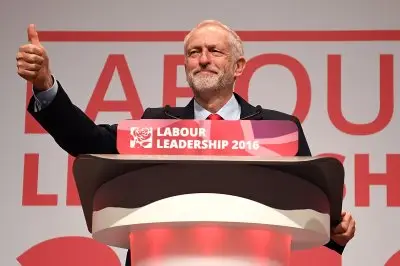None bar a handful of Labour Party members expected this year’s leadership election to result in anything but a thumping renewed mandate for Jeremy Corbyn — even if, at a reception on Sunday night, leading Labour moderates joked (or threatened?) that “Last year, we were the 4.5%; at least this year we are the 38%!”.
Insiders in the anti-Corbyn camp report that moderate organisations like Labour First and Progress have no intention of standing down, even as Momentum, the campaigning organisation rallying support for Corbyn, is said to be ready to work with rebels — to focus on the fallout from Brexit, and on opposing widely divisive Conservative policies including the reintroduction of grammar schools. How exactly the anti-Corbyn faction will proceed now is anyone’s guess; but moderate MPs at Conference gave some indications when overheard to be considering waiting until at least Christmas to assess further options, or mobilising locally after failing to topple Corbyn nationally.
As for the team around the party leader, it seems that humour is being used as the panacea for Labour’s persistent divisions — with Corbyn joking about “Traingate” in his conference speech, and John McDonnell offering to send Chris Leslie a calculator at a fringe event, after the latter criticised McDonnell’s economic proposals. As befits the state of the Party, however, many of these ostensible jokes only harden the lines between different factions further.
Corbyn’s closing speech was widely considered better than his last Conference speech, if primarily in terms of delivery. With regard to content, it was certainly no unequivocal white flag to the rest of the Party. The condemnation of anti-semitism and other types of abuse was a particularly strong conciliatory moment, as the team around Corbyn has historically been accused of being too unassertive in countering this within the Party. Similarly, the Labour leader acknowledged early in his speech that the central task of the whole Party should now be working to rebuild trust in Labour to form a government — a concession to those who accuse the radical left of only caring for a politics of protest, not electoral success. But at the same time, Corbyn’s praise of the new Shadow Cabinet members as “stepping up” carried with it a condemnation of the mass resignations, and London Mayor Sadiq Khan in particularly was visibly unimpressed to be praised by his Party leader — suggesting that his speech was doing little to paper over the cracks.
From a communications perspective, Corbyn’s speech certainly did not move mountains. While it was delivered with confidence, and lines like “A country that doesn’t invest is a country that has given up — a Labour government will never accept second best for Britain” will resonate with those concerned with Britain’s international competitiveness after Brexit, the speech also ranged too widely across topics and did not produce a coherent, compelling narrative about Labour’s vision for the future, reinforced by key themes. It also failed to address structural problems with Labour’s credibility. Proposals such as removing borrowing caps on local councils and funding a free National Education Service by raising corporation tax will incur the familiar charges of Labour’s irresponsible spending habits and anti-business stance — and indeed the exhibition area of Conference was markedly dominated by campaign stalls, rather than industry representatives.
On the whole, this year’s Labour Conference projected a peculiar political mood of paralysis. As the traditional Labour membership wandered the hallways of the Liverpool ACC in a general state of apprehensive resignation, across the docks, the Momentum Conference ‘A World Transformed’ segregated those who were celebrating Corbyn’s renewed mandate. Corbyn may have described his appointees to the Shadow Cabinet after June’s mass resignations as “the future”, but he has already run into difficulties as the media uncovered tensions between his stance on immigration and that of certain members of his Shadow Cabinet team. And so Operation Corbyn continues, renewed but not relieved of the roadblocks in its way.




